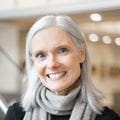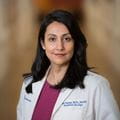The Advanced Course on Cancer-Related Health Disparities Research, Mentoring and Leadership invites leaders from institutions across the country to share their expertise.

Jasjit Ahluwalia, MD, MPH
Professor, Brown University School of Public Health
Dr. Ahluwalia is a physician and public health scientist at Brown University. He has been in academic medicine since 1992, with his primary research areas are health disparities and smoking cessation and nicotine addiction in African-American smokers. He has been continuously funded by NIH for 25 years and has published more than 350 manuscripts. Dr. Ahluwalia is currently appointed to the federal government’s Interagency Committee on Smoking and Health chaired by the US Surgeon General.

Nicola Camp, PhD
Professor of Internal Medicine, Huntsman Cancer Institute
Dr. Camp is a professor in the Department of Internal Medicine and serves as the director of the Utah Population Database (UPDB). Her research focuses on risk and prognosis in common cancers, and includes both development of novel statistical genetic and genomic approaches and their application in discovery studies. She is involved in large collaborative genetic and epidemiological studies, has led international consortia, and co-leads a translational science training program.

Esther Chun-Pin Chang, PhD, MPH
Adjunt Assistant Professor of Public Health, University of Utah
Esther Chun-Pin Chang is an adjunct assistant professor in the Division of Public Health, Department of Family and Preventive Medicine at the University of Utah. Her research expertise encompasses cancer epidemiology, cancer survivorship, health disparities and reproductive health. Her current work focuses on investigating long-term health outcomes among cancer survivors, using novel data linkage to identify cancer recurrence, and addressing health disparities among rural cancer survivors as well as Asian, Hawaiian and Pacific Islander cancer survivors. In addition to her academic endeavors, Dr. Chang is an enthusiast of skiing, stand-up paddleboarding and indoor climbing.

Philip Cheng, PhD
Associate Professor, Henry Ford Health System
Dr. Cheng is an associate professor of medicine at Henry Ford Health in Detroit, MI. His research examines the biopsychosocial dimensions of sleep and circadian disorders. Dr. Cheng is also experienced in facilitating research mentor training and has specific interests in cultivating culturally aware and responsive mentoring, with curricular expertise in the Culturally Aware Mentoring module offered via NRMN. He is developing curriculum that target issues specific to LGBTQ+ communities.

Pebbles Fagan, PhD, MPH
Professor of Health Behavior and Health Education, University of Arkansas for the Medical Sciences
Dr. Fagan is a professor and director of the Center for the Study of Tobacco in the Fay W. Boozman College of Public Health, University of Arkansas for Medical Sciences. She collaborates with diverse disciplines and has lead NIH-funded projects and programs including: the Center for the Study of Tobacco Products, the Arkansas Center for Health Disparities, the Arkansas Community Engagement Alliance Against COVID-19 Disparities, and the Center for Research, Health, & Social Justice.

Heidi Hanson, PhD
Group Leader of Biostatistics and Multiscale System Modeling, Oak Ridge National Laboratory
Dr. Hanson is a senior scientist and group lead at Oak Ridge National Laboratory. She is a demographer and life course epidemiologist, with expertise in analysis of population health data. She is the technical lead of a joint NCI-DOE Modeling Outcomes and is involved in a project investigating suicide and opioid overdose mortality using Veteran’s Administration data through the VICTOR project. Her previous projects have utilized large health databases such as the UPDB, NHANES and SEER.

Mia Hashibe, PhD
Founding and Former MPI on the R25 Advanced Course
Adjunct Professor of Epidemiology University of California, Los Angeles
Dr. Hashibe was the MPI alongside Dr. Okuyemi and helped submit and create the curriculum and evaluations criteria for the UE5 Advanced Course between 2019 and 2024. In 2024, Dr. Suneja took over her role as MPI on the project when Dr. Hashibe moved from the University of Utah to UCLA. She is the scientific coordinator and one of the founding members of the International Head and Neck Cancer Epidemiology Consortium. Her studies include a head and neck cancer genetics study, multicenter head and neck cancer case-control study in East Asia, a lung and head and neck cancer study in Nepal and a rural cancer survivors study in Utah.

Kim Herget, MStat
Biostatistician with Expertise in SAS Coding and Data Linkages, Utah Cancer Registry
Kim Herget, MStat is an expert biostatistician for the Utah Cancer Registry. She conducts statistical analysis, including frequencies, rates, regressions, and survival models, and also writes SAS code to complete data linkages using a variety of statistical software from numerous external data sources. Kim has served on several state-wide analytic committees and workgroups. Her responsibilities include verifying the accuracy of linkages, correcting discrepancies and updating databases.

Anne Kirchhoff, PhD, MPH
Professor of Pediatrics, Division of Hematology/Oncology, University of Utah
Dr. Kirchhoff is a professor of pediatrics in the Division of Hematology/Oncology and a Huntsman Cancer Institute investigator in the Cancer Control and Population Sciences research program. As a health services researcher, her program primarily concerns evaluating patient outcomes related to health care access and cancer late effects, and developing interventions for childhood, adolescent and young adult cancer survivors, with a focus on addressing the social and financial consequences of cancer.

Yuan-Chin Amy Lee, PhD
Assistant Professor of Family and Preventive Medicine, University of Utah
Dr. Lee is an adjunct assistant professor for the University of Utah, a Huntsman Cancer Institute investigator, and a member of the Cancer Control and Population Sciences program. Lee's research focuses on how and why cancer develops in the general population. She studies risk factors and prognostic factors for smoking-related cancers, and her research goal is to identify cancer-preventing habits, and eventually ingrain healthy practices that reduce cancer risk and improve the lives of cancer patients.

Grace X. Ma, PhD, CHES
Associate Dean for Health Disparities, Temple University
Dr. Ma is associate dean for health disparities, founding director of Center for Asian Health, Laura H. Carnell Professor at Temple University and primary member of Fox Chase Cancer Center of Temple University Health System. She is a nationally recognized behavioral health scientist and a leader and pioneer in cancer and health disparities research. She has mentored over 260 diverse mentees aiming to help create a pipeline to a more diverse workforce of researchers in health disparities.

Richard McGee, PhD
Associate Dean for Faculty Recruitment & Professional Development, Northwestern University
Dr. McGee is the associate dean for professional development at Northwestern University Feinberg School of Medicine. His primary aim is to support development of the independent research programs of early career faculty utilizing a novel grant writing coaching group process he developed over the past 20 years. Dr. McGee is also deeply involved with the National Research Mentoring Network (NRMN) with new approaches to teaching and studying culturally aware mentoring and grant writing skills.

Kola Okuyemi, MD, MPH
PI for the R25 Advanced Course
Associate Dean for Health Equity Research and Implementation
Chair, Department of Family Medicine, IU School of Medicine
Dr. Okuyemi is PI for the NCI-funded Advanced Course and professor and chair for the Department of Family Medicine, and associate dean for health equity research at IU School of Medicine. With over 20 years of experience as an effective executive leader and researcher, he has focused on research and training programs that improve the health of underserved populations and elimination health disparities and inequities using community-engaged research alongside pharmacological and culturally tailored behavioral interventions.

Kenneth Resnicow, PhD
Professor of Health Behavior & Health Education, University of Michigan, School of Public Health
Dr. Resnicow is the Irwin Rosenstock Professor of Health Behavior and Health Education at University of Michigan, the associate director for community engagement and health disparities research at the University of Michigan Rogel Cancer Center, and chief scientific lead at the university’s Center for Health Communications Research. His work focuses on designing and evaluating behavior change programs for a wide range of health behaviors, and much of his work has involved underserved populations.

Gita Suneja, MD, MS
MPI on the R25 Advanced Course
Senior Investigator at HCI and Professor of Radiation Oncology, University of Utah
Dr. Suneja is a radiation oncologist with a strong foundation in health services and health equity research. Her clinical specialties include the treatment of breast and gynecologic malignancies, and her research program focuses on cancer treatment and outcomes in the HIV population. She has substantial experience conducting research and providing clinical care to people with HIV and cancer both in the U.S. and in global low resource settings, as well as in advancing workforce diversity in medicine and science.

Antonius Tsai, MBA
Director of Education Strategy and Leadership Development, University of Utah School of Medicine
Tony Tsai, MBA is the director of career and leadership development for University of Utah Health Sciences. He helps people connect to their purpose in their careers through coaching and leadership training. In previous roles, he has led strategic transformation efforts in medical education at the University of Michigan Medical School and University of Utah Medical School. He was a former officer in the U.S. Army and holds an MBA from Columbia Business School and a BBA from the Wharton School of Business.

Cornelia Ulrich, PhD, MS
Chief Scientific Officer and Executive Director, Comprehensive Cancer Institute at HCI
Dr. Ulrich is the executive director of the Comprehensive Cancer Center at Huntsman Cancer Institute. She is also a Jon M. and Karen Huntsman Presidential Professor in Cancer Research in the Department of Population Health Sciences at the University of Utah. She is an epidemiologist who focuses on lifestyle and biologic factors in cancer prevention and prognosis. As chief scientific officer and cancer center executive director, Dr. Ulrich oversees more than 230 cancer research teams.